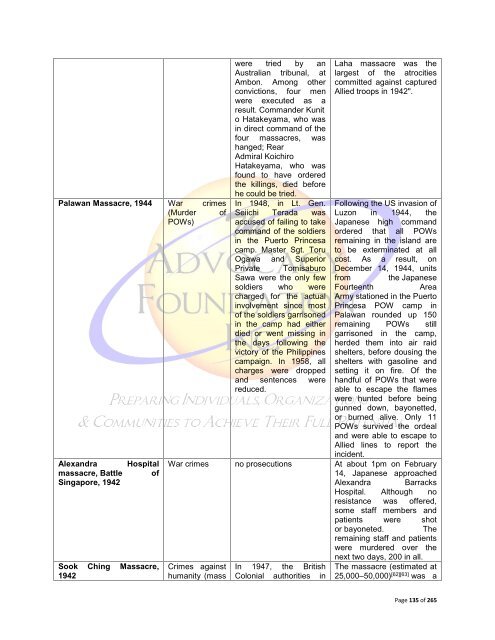The Law of War
The Law of War
The Law of War
Create successful ePaper yourself
Turn your PDF publications into a flip-book with our unique Google optimized e-Paper software.
Palawan Massacre, 1944 <strong>War</strong> crimes<br />
(Murder <strong>of</strong><br />
POWs)<br />
Alexandra Hospital<br />
massacre, Battle <strong>of</strong><br />
Singapore, 1942<br />
Sook Ching Massacre,<br />
1942<br />
were tried by an<br />
Australian tribunal, at<br />
Ambon. Among other<br />
convictions, four men<br />
were executed as a<br />
result. Commander Kunit<br />
o Hatakeyama, who was<br />
in direct command <strong>of</strong> the<br />
four massacres, was<br />
hanged; Rear<br />
Admiral Koichiro<br />
Hatakeyama, who was<br />
found to have ordered<br />
the killings, died before<br />
he could be tried.<br />
In 1948, in Lt. Gen.<br />
Seiichi Terada was<br />
accused <strong>of</strong> failing to take<br />
command <strong>of</strong> the soldiers<br />
in the Puerto Princesa<br />
camp. Master Sgt. Toru<br />
Ogawa and Superior<br />
Private Tomisaburo<br />
Sawa were the only few<br />
soldiers who were<br />
charged for the actual<br />
involvement since most<br />
<strong>of</strong> the soldiers garrisoned<br />
in the camp had either<br />
died or went missing in<br />
the days following the<br />
victory <strong>of</strong> the Philippines<br />
campaign. In 1958, all<br />
charges were dropped<br />
and sentences were<br />
reduced.<br />
Laha massacre was the<br />
largest <strong>of</strong> the atrocities<br />
committed against captured<br />
Allied troops in 1942".<br />
Following the US invasion <strong>of</strong><br />
Luzon in 1944, the<br />
Japanese high command<br />
ordered that all POWs<br />
remaining in the island are<br />
to be exterminated at all<br />
cost. As a result, on<br />
December 14, 1944, units<br />
from the Japanese<br />
Fourteenth<br />
Area<br />
Army stationed in the Puerto<br />
Princesa POW camp in<br />
Palawan rounded up 150<br />
remaining POWs still<br />
garrisoned in the camp,<br />
herded them into air raid<br />
shelters, before dousing the<br />
shelters with gasoline and<br />
setting it on fire. Of the<br />
handful <strong>of</strong> POWs that were<br />
able to escape the flames<br />
were hunted before being<br />
gunned down, bayonetted,<br />
or burned alive. Only 11<br />
POWs survived the ordeal<br />
and were able to escape to<br />
Allied lines to report the<br />
incident.<br />
<strong>War</strong> crimes no prosecutions At about 1pm on February<br />
14, Japanese approached<br />
Alexandra Barracks<br />
Hospital. Although no<br />
resistance was <strong>of</strong>fered,<br />
some staff members and<br />
patients were shot<br />
Crimes against<br />
humanity (mass<br />
In 1947, the British<br />
Colonial authorities in<br />
or bayoneted. <strong>The</strong><br />
remaining staff and patients<br />
were murdered over the<br />
next two days, 200 in all.<br />
<strong>The</strong> massacre (estimated at<br />
25,000–50,000) [62][63] was a<br />
Page 135 <strong>of</strong> 265

















